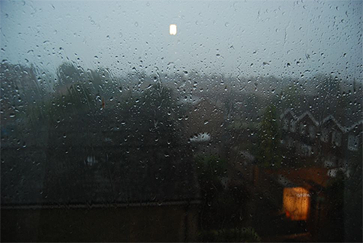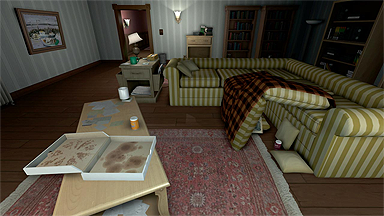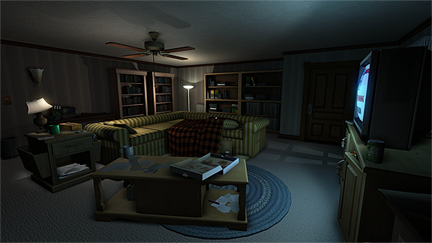Gone Home
26/10/2013

As a child I have many memories of arrival back home after having been on holiday. These are almost all set to dark evenings driving back through London. I remember pressing my face up to the car windows, perspiration from the wet roads rolling down them, distorting off-licenses and terraced houses as they pass by. This journey was always somewhat ritualistic. As we drove through the edges of London we'd eventually reach an area I'd recognize. Soon after that would come Wandsworth, Furzedown, and eventually Home.
When we reached the house my parents would turn the heating back on. We'd huddle around the TV with drinks and food. That was my first house, before we moved, and before I left for university. And so these remain some of my most potent emotional memories, that I will never relive again. The problem is, since moving away, I've got another home now. And I've had ones before that too, moving around as a student. Even so it still doesn't stop me from searching for that arrival anew.
Gone Home starts here. You play as Kaitlin, arriving home to a new house, after a week long trip to Europe. The night is stormy and wet (and dark and thundery and scary etc.). The new house is ancient, cavernous and mysterious. Left on the door is note by your younger sister Samantha asking you not to try and find her, or to investigate what has happened, with no more information given. As you explore the house it appears to be deserted. The rest of the game is spent uncovering exactly what has happened while you've been away and where everyone is.

Although the atmosphere can be creepy, even scary, this isn't a horror game. It progresses calmly, and steadily, and the narrative is contemporary. The story is told visually as much as audibly. It features voice-overs in the form of Samantha's diary. Yet the house also tells its own tale with objects and paraphernalia left around that explain the life of each of the members of the household. Fewer things are more joyful than a great story told visually (from Dr Seuss to Into the Wild). A particularly touching moment for me was walking into the bathroom to see a large red stain over the bath. I felt a genuine pang of worry for my sister. Approaching the bath I realized it the stain was red hair-dye. Shortly followed an extract from Samantha's diary describing one of the more intimate moments of the story. Slowly my feeling changed from concern to compassion.
There isn't much real gameplay, but that is somewhat to be expected with these sort of games. It's becoming more clear (and the review scores reflect it) that we don't require constant gunshots and explosions to be entertained or enjoy games. Sometimes the more subtle experiences are equally rewarding.
I have memories of moving into our second house, and of being alone there in the evenings. Unlike the fantasy and escapism of many games, Gone Home gives you a chance of projecting yourself, and your own memories onto a character and environment. It enriches the house beyond the vision of the artists, and cranky atmosphere. In this way it can contains a tiny nugget of human truth - which is what storytellers always try to dig out.

There has been a lot of experimentation in this genre with games such as The Stanley Parable and Dear Esther attracting considerable media attention and recognition. Unlike these titles I don't believe Gone Home was built to change perspectives, or leave a peculiar taste in mouths. It doesn't play with the aspect of being a game (or not a game). The fact it has been received so well shows there is room for wholesome meals in this market.
Gone Home isn't perfect and it wont be to everyone's tastes. But it is warm, honest and generous. It does not ask a lot of the player, and gives rewards freely. It is a sweet novella amongst the many hard stones and sharp edges of modern game development.